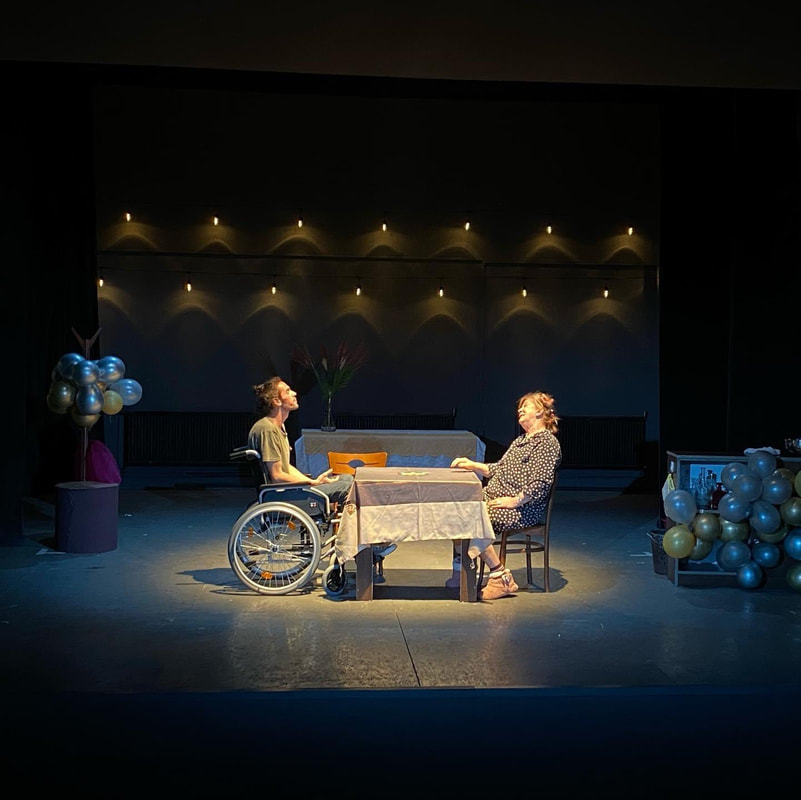|
Review by Florida Kastrati As people sit on the theatre seats, the stage is already set. An old woman, whose hair is in the curlers, is waiting for us. She has been waiting for people to come and go in the same, dark room, every single day; for a long while, this has been her life.
The set, designed by Theranda Sertolli, consists of a table with two chairs, closed curtains, a small kitchen with all the ingredients of a cake waiting to be made. Some balloons in the back frame the audience’s view. Although inanimate, these balloons bring some color to this dull place. The play The Birthday, written by Ivor Martinić and directed by Iliriana Arifi, absorbs the spectators. From the very beginning, the actors and the staging catch your attention and hold it; you enter into the world of the play smoothly, almost without noticing it. The room has been adorned in this way for Denis’ 25th birthday. Denis was fine when he was a child but soon he became ill, and he lost his ability to walk. At first, he used crutches, and lately, as his health got worse, his family bought a wheelchair for him. His health is in constant decay, just as is the main characters’ approach to life. Denis chooses to be alone most of the time, using his wheelchair to go to the park, feed pigeons and sometimes even meet Sara. “I don’t love her, but she loves me and that’s just fine,” he says. You expect Denis to talk more, but he doesn’t. He chooses quietness and less crowded places, probably because he has had enough of people. The ones who know Denis think of his wheelchair as clumsy, and strangers can’t stop staring because they think of him as “different”. Mia, the housewife, Denis’ mom, the caretaker and much more, clearly doesn’t live life for herself. She is one of those women, of which there are many, who dedicate their entire being to their families, their husbands and children, and their husband’s family, their own family and even animals - cats and green canaries. Both Rebeka Qena who played Mia and Labinot Raci as Denis, played straight to the heart, deeply touching the audience with their affecting performances. They could transmit to the audience the routine of these characters’ lives, the routine of one single day, a routine that for the people in the play is that of a lifetime. The society in which the characters live is fully judgmental, their lives are full of regrets: people they haven’t been with, places they haven’t travelled, ardent dreams that now merely tempt the characters as delusional. They are caught in a paralyzed way of life. Mia can’t accept the fact that her 25-year-old paraplegic son can’t walk. She does the impossible for him to appear smiling and barely standing up in the yearly photos the family takes. And Mia loves her invalid son extremely. She loves him with that blind kind of love that deprives you of living. That kind of love that brings more darkness, despair and tears, for sickness is outside our control. But Mia knows that “Some things need to be saved and used moderately. Nice dresses, love, tears and things like that.” Although she doesn’t quite practice it in her life. Mia knows that she is keeping too much of a heavy burden with her, but can’t let go easily. Again, she forgets to turn on the lights of the room. And bang! One of the balloons pops by itself and the curtains drop down. The play ends. But the world, well, the world ends with a whimper right, rather than a bang? By: Ivor Martinić // Directed by: Ilirjana Arifi // Cast: Rebeka Qena, Labinot Raci, Igballe Qena, Bislim Muçaj, Sheqerie Buçaj, Florenta Bajraktari, Alketa Sylaj // Stage and Costumes: Theranda Sertolli // Light Design: Skender Latifi // Stage Technicians: Albert Gashi, Bedri Maloku, Fadil Bekteshi
0 Comments
Leave a Reply. |
Kosovo Theatre ReviewsReviews and creative responses to theatre productions in Kosovo Archives
November 2022
Categories |

 RSS Feed
RSS Feed
